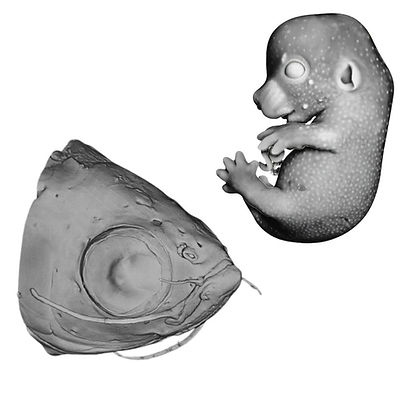High-Resolution Episcopic Microscopy / Applications / Mice and Zebrafish
Zebrafish and Mice 3D Imaging
Imaging of Mice and Zebrafish in 3D at Micron Scale
Image whole 2D stacks of micron scale images, aligned for 3D morphological reconstruction using High-Resolution Episcopic Microscopy (HREM).

HREM for Mice and Zebrafish
High Resolution Episcopic Microscopy (HREM) is used to capture mouse and zebrafish samples, from whole organs to whole samples. OHREM instruments produce large high quality, high throughput stacks with no need for sample clearing or distortion to the block.
This microscopy technique allows for imaging both zebrafish and mice in full 3D, combined with whole 2D images for analysis.
Examples of HREM Applications in Zebrafish and Mice
HREM can be used for a variety of scenarios within mice and zebrafish such as:
-
Knockout trials of whole mice pups and embryos. Optical HREM can image whole mice as part of a large knockout trial.
-
Cardiovascular imaging of mice and zebrafish. Visualise whole hearts from mice and zebrafish in 2D and 3D.
-
Imaging Brain matter of mice and zebrafish. Whole brains can be imaged in 3D.
-
Whole mouse organ imaging. HREM has been used to image adult mouse kidney and more.
Advantages for using HREM for Imaging Mice and Zebrafish
Larger Sample Sizes
Sample sizes from under 1mm up to 25mm, more if requested allowing for imaging a whole range of mice and zebrafish samples.
High Resolution
HREM technique provides 1–6-micron voxel size resolution, which allows for detail beyond other 3D technology.
No Sample Clearing
No sample clearing, HREM does not require clearing of samples for the images to be produced.
3D Mouse Embryo and Mouse Pups in Full
Optical HREM systems are often used to capture full morphological data in 3D of mouse embryo and mouse pup samples. The technique High-Resolution Episcopic Microscopy allows for high contrast images with huge amounts of detail even within denser parts of the sample.
Gallery of Zebrafish and Mice Models
Here are some example captures from the Optical HREM systems, from us and our customers. They show zebrafish, mice, and individual organs.
















